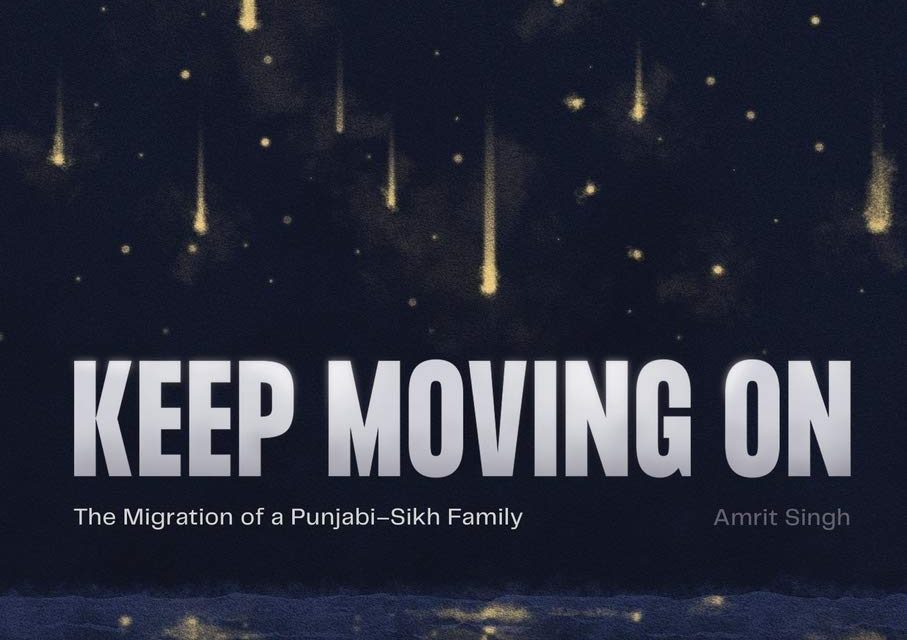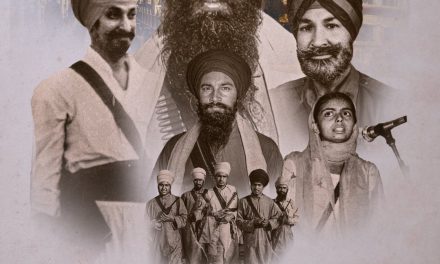Earlier this autumn I pre-ordered a book that was due to come out before the end of 2020 from one half of my favourite Sikh-Punjabi musical act. I was looking forward to reading the work from Amrit Singh over the holidays, but was pleasantly surprised to find that a digital proof was made available to me in advance of the release for reviewing purposes. Having devoured the book a number of times over the last month, I am so glad it was sent to me early and I was able to give it the time it deserved ready for the launch; ‘Keep Moving On‘ is a phenomenal read that has the capacity to inspire real familial engagement amongst migrant generations, instigate much-needed conversation within Sikh-Punjabi households, and to potentially transform personal lives from what we see as ordinary into the extraordinary.
Amrit Singh, known as ‘Noyz’ in the rap World, is an incredibly talented spoken word artist, community organiser and story-teller. His work as an MC includes the excellent solo album ‘Degrees of Freedom‘ (2012), the infamous eponymous album ‘Zoo Babies‘ (2014), and the Dusty Loops produced ‘LO FI GLORY‘ (2019). Together with fellow Toronto rapper B Magic, Noyz has performed under the moniker ‘Movin’ Cool’ for a number of years to high acclaim, as well as co-host ‘The Immigrant Hustle‘ podcast, and that may be the way in which many of our naujawani readers will know him best.
Although ‘Keep Moving On‘ is Amrit Singh’s first foray into publishing, it should come as no surprise that his talent for insightful words and narration has made the leap on to the printed page. This work is self-published, and at twenty chapters across two hundred pages, that’s no mean feat. He has handily included a glossary at the opening of the book, and a selection of (reference) notes at the conclusion, so that non-Punjabi-Sikhs can pick up some of the terminology and context of his words. But even without utilising those, this is quite an incredible read for anyone and that is because Amrit Singh’s ability as a story-teller is exceptional – he provides enough information to keep the reader interested without allowing himself to over-indulge. He expertly regales his familial tale of migration, centring around his father Satnam, but incorporating his mother, parents’ siblings, grandparents and others, all the while sensitively traversing the happening that launched his research and documenting of the family journey to Canada – his mother Narinder’s cancer diagnosis.
The opening chapter is a succinct declaration for why Amrit Singh is writing this book and his notion to connect the past with the present in these opening lines shines through in every chapter. His hope to provide the reader with the realisation that “all people are capable of courage, strength, and a resilience to keep moving on“, is more than achieved as is his aim to give permanence to his father’s journey. In fact, by the conclusion of the book you’re left with the feeling that you know Satnam Singh yourself, and would like to sit down with him for a cup of tea, or as I would prefer, the opportunity for discourse of Gurbani. But don’t be mistaken; this work does not fit the father-son trope that we find elsewhere in the South Asian community, for example in fellow Canadian Jagmeet Singh’s ‘love & courage‘. ‘Keep Moving On‘ is an altogether more complex and layered story, that doesn’t depict finite conclusions or upbeat endings. It is an exposition of reality and the World we live in where the past and the present intertwine. The author’s relationship with his father continues to grow and the research for this book will have advanced that, but does not offer an instantaneous solution for their pains.
It is in no small part Amrit Singh’s attention to detail when depicting a scene that makes this book such a fascinating read. Objects and places are brought to life and given material substance so that the reader can picture the atmosphere that the author so clearly envisages himself. Similarly, he respects everybody from his family’s past that makes it into this work by proffering their name and their respective relationship title, suffixed by ‘ji’; but in giving us their name he allows the reader to immediately conjure an identity for that individual and not simply consider them a mere supporting act. It helps that some elements of this story reflect my own experience as the offspring of Sikh-Punjabi migrants – Deepa and the tractor, Dhadha Dhanna Singh ji for example – which can aid visualisation, but in all honesty, I found so little in Amrit Singh’s upbringing that mirrored mine, I don’t think it’s necessary. Anybody can pick up this book to enjoy an enthralling tale of migration, juxtaposed with the feelings and direction in life taken by a Toronto-based brown guy who was born in the 1980s.
That being said, I earnestly believe that ‘Keep Moving On‘ heralds a shift within the Sikh-Punjabi migrant community specifically, to not only re-tell the stories of elders, but to engage with them differently whilst they are still here; to perceive what we might see as a limited or authoritarian or money-oriented attitude as one shaped by the upheaval of leaving behind all that you knew because “there is no future there“; to reflect upon and appreciate that our lives today as the offspring of migrants are that much easier thanks to the ability of our recent ancestors to keep moving on.
‘Keep Moving On: The Migration of a Punjabi–Sikh Family‘ is available to buy online at a range of retailers (full list at https://www.noyzhiphop.com/)







